Wednesday, November 18, 2009
2012 The Movie and the Laws of Attraction

It is possible that scenarios like 2012 do offer a way for people to express their subconscious fears about death in a way that is somewhat superficial and make-believe and thus avoid dealing with the reality of life and death in this world. My guru, Baba Muktananda, used to say that you should remember two things - God and death. Creating these make-believe frightening scenarios may help people remember that life in this world is temporary - even for a couple hours. So in this way, it is possible that watching movies like 2012 serves some useful purpose along those lines. However, it can also set the stage for more disasters to take place.
 I remember when the Independence Day movie came out five years before the 9-11 terrorist events with all those national landmarks being blown up, and I thought, "This can't be good to put such images so vividly and emotionally into minds all around the world." When the pentagon burst into flames on 9-11, I remembered that movie.
I remember when the Independence Day movie came out five years before the 9-11 terrorist events with all those national landmarks being blown up, and I thought, "This can't be good to put such images so vividly and emotionally into minds all around the world." When the pentagon burst into flames on 9-11, I remembered that movie.According to ancient spiritual scriptures that form the underlying spiritual science behind contemporary spiritual "use your mind to get what you want" fads, the mind is a contracted form of the same Universal Consciousness that creates this entire universe. Therefore, what we think and visualize affects that creation to some degree - and to a greater degree when millions of people are seeing and thinking about the same things.
Labels: 2012, 2012 movie, power of media, power of the mind, societal responsibility, spirituality
Thursday, June 25, 2009
Michael Jackson: Too Miraculous For This World

Michael Jackson was too miraculous for this world - he suffered from a neverending conflict of all his genius flow and deep love and need for love meeting the ignorance and restrictiveness (and parental and tabloid cruelty) of today's culture, which created all kinds of problems in his psyche that became reflected in the obsessive surgical work he had done on his face, as well as his strange ways. This kind of destruction of a beautiful talented soul has not been an uncommon fate for geniuses and divinely inspired artists throughout history.
"But I could have told you Vincent (Van Gogh),
this world was never meant for one as beautiful as you."
- Don McLean
Labels: artist, genius, michael jackson, psyche, society, spirituality
Wednesday, June 24, 2009
Rethinking Marriage

The recent confession of an affair by South Carolina Governor Sanford after going missing in Argentina for five days (can anyone say “setting the stage to get caught?”), coming just on the heels of Jon and Kate’s well-publicized break-up (and just who is watching that show anyway?) once again brings to light the topics of personal evolution, societal dictates, and marriage.
Human individuality has evolved to the point where one's personal journey and desires often supplant the expectations of lifelong fidelity and other rules that seemed generally easier for previous generations to follow. Many people today find it difficult to live a growth-filled life while fitting into society’s constructs about who and how they should love, for how long. Every culture has rules, and there are times when outer events point the way to some kind of change of rules, as with current discussions about defining and redefining marriage.
I lived in a communal ashram for a decade in the 1980s, and many people were getting married, with some having children or getting divorced. But throughout whatever changes took place, the sense of community was there. Children of divorced parents would still have the stability of regular children's educational fun programs, and the caring eye of their friends’ parents, as well as all the communal family. One member of a beloved family of the community was on 9-11’s flight 93, and the whole community, from head guru on down, came together to give his surviving wife and child solace and help them to find some happiness in spite of the tragedy. I would think that empowering neighborhoods and family, friendship, spiritual, and local communities to shift toward a more “it takes a village” type of approach would be beneficial in general with today's skyrocketing cheating and divorce rates.
Here is an excerpt from Spirituality For Dummies that discusses some more thoughts about this topic.
From Relationships to Divine Love
From Spirituality For Dummies
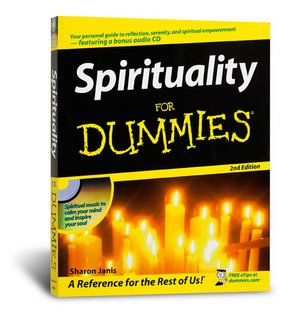
Though I speak with the tongues of men and of angels, but have not love, I have become sounding brass or a clanging cymbal. And though I have the gift of prophecy, and understand all mysteries and all knowledge, and though I have all faith, so that I could remove mountains, but have not love, I am nothing.—1 Corinthians 13-1-2
Along with the inherent blessings of experiencing love, good relationships can bring great opportunities for spiritual, mental, and emotional growth. Human beings are naturally drawn to relate with other people. It is through relationships with others that we grow and discover more about the world and ourselves. Jesus has said that he is present whenever two or more are gathered in his name, indicating the importance and power inherent in joining with other souls during your journey through life.
Mutual affection soothes the heart, while intelligent conversations spark new vistas of thought. The support you feel and receive from loved ones gives you the strength to move forward courageously in whatever you’re inspired to do. Even when some aspects of your relationships may be rubbing you the wrong way, a spiritual focus can help you to see the blessings beneath the irritations, and the lush growth budding beneath the outer storms.
All you need is love
The topic of love pervades most music, books, and television and movie scripts. Love is the essence of your spirit; therefore, finding ways to release and reveal your love can also help you to experience and express your spirit. Here are some wise words about love:
- One word frees us from all the weight and pain of the world; that word is Love.
—Sophocles - Love consists in this, that two solitudes protect and touch and greet each other.
—Rainer Maria Rilke - In love the paradox occurs that two beings become one and yet remain two.
—Erich Fromm - Love gives naught but itself and takes naught but from itself. Love possesses not, nor would it be possessed; for love is sufficient unto love.
—Kahlil Gibran - Love takes up where knowledge leaves off.
—Saint Thomas Aquinas - At the touch of love everyone becomes a poet.
—Plato
When Harry met Sally: Love, relationships, and potential potholes
My wife and I were happy for 20 years. Then we met.—Rodney Dangerfield
Okay, seriously folks: Any corporation with a failure rate as high as today’s divorce rate — right around 50 percent in the United States — would have to reexamine its internal structures and would probably go out of business. This high percentage of marital breakups is an indicator that things may be changing and evolving in human-relationship land.
Most people want to find a soul mate who will love, understand, relate, respect, and live with them happily ever after. However, few people are fortunate enough to find a true soul mate in this life. Even so, many still want to have some companionship along their paths, and so they settle for relationships that seem to be compatible and loving in the moment, but which may change into being not so compatible or loving in the future.
Due to cultural traditions, a couple may feel obliged to sign on the dotted line of vows that don’t necessarily carry the full depth of their souls’ conviction, such as promising to stay together “in sickness and in health, until death do us part,” when these vows may not reflect their true feelings and intentions. Even if both parties are fortunate enough to stay alive and healthy, today’s focus on individual growth may bring some to seek their future growth in different directions from their partners. Therefore, honesty, respect, and communication are paramount in any relationship. Don’t just repeat vows you don’t really mean. Either rewrite your vows or contemplate deeply to make a true commitment to keep them.
Even with all the shifts and changes that are inevitable with two intertwined lives, you can keep your relationship vibrant, strong, and ever-deepening. With mutual respect and flexibility, you and your partner can allow and support each other in following your dreams and aspirations while maintaining your connection of love and commitment. The key to keeping your vows without selling out your greater dreams is to understand and appreciate the preciousness of life and of each soul’s journey in this world. Without respect for each other’s growing and changing interests and inspirations, a previously promising relationship can end up crumbling into resentment, dishonesty, and anger.
Maintain good communications with your loved one about what you really commit to and how you plan to keep growing individually and together. Everyone has different beliefs and expectations when it comes to the “rules of relationships.” Discuss yours with your partner so that you can both make real vows that you can honor and keep while you are together, and also if the time ever comes that you move and grow into separate directions.
Marriage is a great institution, but I'm not ready for an institution..
—Mae West
Avoiding mediocre relationships
Sometimes people want to have a relationship so badly that they’ll settle for a mediocre one. My parents did this and went through many years of unhappiness with one another before finally going their separate ways (and for you Freuds out there, yes, seeing and hearing their plentiful arguments probably did help inspire me to go for a monastic-style relationship with the divine).
Making insincere long-term commitments to a mediocre relationship just to please others or fulfill an expectation or desire can possibly hold you back on your greater spiritual journey, because:
- Mediocre relationships can keep you from growing past the level where you and your companion meet intellectually, emotionally, and spiritually. As Henry David Thoreau said, “The man who goes alone can start today; but he who travels with another must wait till that other is ready.” If you and your partner have a deep soul level connection, then you’ll be able to give each other the space to grow individually as you also continue to grow together.
- Your companion may not support your spiritual efforts. Some spouses may even feel jealous if you start paying more attention to God or spirit than to them.
- Relationships can consume a lot of precious time and energy. A good relationship or marriage can give greater value to your time and efforts, but a mediocre one may leave you in the end feeling the burden of unfulfilled dreams and wasted years of useless activities and meaningless arguments and banter.
- You can’t really be too spontaneous and carefree when someone else is depending on you to always be exactly who and how you have always been. While steadiness is a great quality to develop, at some point you may be spiritually guided to make some dramatic changes in how you approach and relate to life.
A not too far-fetched scenario
A husband and wife are having dinner at a very fine restaurant, when a gorgeous young woman comes over to their table, gives the husband a big kiss on the lips, says she'll see him later, and walks away.
The wife glares at her husband and asks, "Who was that?"
"Oh," replies the husband, "she's my mistress."
"Well, that's the last straw," says the wife. "I've had enough! I want a divorce."
"I can understand that," replies her husband, "but remember, if we get a divorce it will mean no more shopping trips to Paris, no more wintering in Barbados, no more summers in Tuscany, no more Lexus in the garage, and no more yacht club. But the decision is yours."
Just then, a mutual friend enters the restaurant with a beautiful young woman on his arm.
"Who's that woman with Jim?" asks the wife.
"That's his mistress," says her husband.
"Ours is prettier," she replies.
Although this scenario is meant to be a humorous commentary on why some relationships stay together, every person can look at their own lives and situations to find ways that they may be selling out what is really important — in the case of this story, true love — for lesser comforts and materialistic benefits.
Labels: divorce, fidelity, governor mark sanford, mark sanford, marriage, spirituality
Friday, May 15, 2009
American Idol, Wishing, and Life Lessons

I would like to see Adam win. Not as much as I wanted to see Barack Obama win, but with the same sense of rightness. Adam’s rendition of Mad World was soul stirring for me, and I love that he is gay and confident and relishes his own flamboyant, lovely, wild self, not to mention his amazing vocals  that range from explosive to tender, with a theatrical actor’s ability to play many roles with sincerity. Adam Lambert reminds me of one of my childhood favorites, David Bowie, who also pushed past many limits but still remained somehow relatable, relevant, and musically great. At age 15, I even cut my hair similar to Bowie’s and dyed it bright red.
that range from explosive to tender, with a theatrical actor’s ability to play many roles with sincerity. Adam Lambert reminds me of one of my childhood favorites, David Bowie, who also pushed past many limits but still remained somehow relatable, relevant, and musically great. At age 15, I even cut my hair similar to Bowie’s and dyed it bright red.
My wanting Adam to win American Idol brings up an analogous life lesson. Sometimes we want something in life – whether to get the guy or girl, or the job, house, have the child, win the award, and so on. That want for an outer circumstance is like wanting Adam (or Kris) to win – focusing on a specific desire you would like to have fulfilled in a specific way.
But if you go deeper, beneath the obvious news headline surface, what is it that you really want? Do you want Adam or Kris to win and then make a bad CD? No, of course not. What is it that we really want when hoping for a specific outcome in American Idol, or within any arena of life? We may be praying, affirming, and using various laws of attraction to move the universe into giving us an apparent desired outcome, but really, what we want is  deeper than that specific outcome.
deeper than that specific outcome.
What we really want if we’re an Adam Lambert fan is for him to be successful, making great music that we’ll be able to enjoy for years to come. If for whatever reason – karmic or contractual – Adam would make better music as the runner up rather than the crowned idol, well then that is probably what we would more deeply want. Look at the publicity the runner up to Miss America 2009 received in contrast to the winner due to the controversy of her response to Perez Hilton’s question – hers may not necessarily be the kind of publicity those who support Adam Lambert might want, but it is publicity nonetheless, and Carrie Prejean has certainly taken full advantage of the spotlight, while very few people remember who won the Miss America contest this year.
In life also, what we really want is often different from the outer potential symptoms of that deeper want. Let’s say you want to get a specific person to fall in love with you, but what you really are looking for is the powerful love that comes from being with the right person. If that specific person is also the right person, well then you’re in luck. But if they’re not, then you may spend all your effort, intention, and energy to create the outer circumstance you want but without the inner happiness you thought would accompany it.
You want to get that apartment or house, but what you really want is to be in a place that will give you peace, beauty, safety, and happiness. You pray clear to the bones to get that job, but really, you would be happy to not get it if only you knew of the even greater opportunities waiting beyond that disappointment.
So as we watch the upcoming finale, regardless of who we hope will be the American Idol 2009, let’s also use this opportunity to practice keeping a deeper vision as Ryan Seacrest takes us from dramatic commercial break to dramatic announcement music. Then we can also use the same deeper view to focus on the more essential qualities behind our intentions, wishes, and desires – qualities like happiness, peacefulness, wisdom, service, and love.
Labels: adam lambert, american idol, kris allen, spiritual laws
Thursday, May 07, 2009
John Edwards, Elizabeth Edwards, Rielle Hunter, and the Gambling of Our Country and World
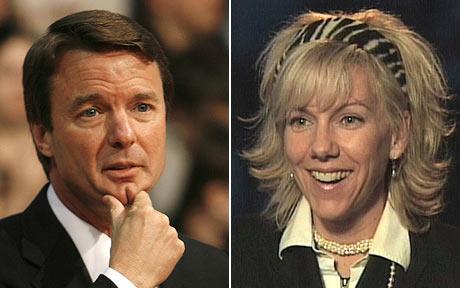
 Knowing how people in today's society think and feel about affairs, cheating, and lying, Edwards took the chance and created the possibility of his being the democratic nominee, knowing that surely (the tabloids had already been rumbling with it) this career-ending honeycomb of dishonesty would come out at the last minute, destroying his campaign and most likely allowing for more destruction of this country and, through it’s impact, the world.
Knowing how people in today's society think and feel about affairs, cheating, and lying, Edwards took the chance and created the possibility of his being the democratic nominee, knowing that surely (the tabloids had already been rumbling with it) this career-ending honeycomb of dishonesty would come out at the last minute, destroying his campaign and most likely allowing for more destruction of this country and, through it’s impact, the world. When I arrived in Hollywood in 1989 after a decade of dedicated spiritual life in a monastic ashram, I found waiting for me karmic connections with many who were or would become celebrities. In a dramatic shift from monastic life, I had many visits and chats with Arnold Schwarzenegger, including a couple hours spent chatting and drinking peppermint schnapps with him on Thanksgiving evening. I lived in a small studio cottage with a then struggling Italian actress, now billionaire, and even gave Michael Eisner half of my sandwich once when he was hungry (in spite of the 50 million dollars in stock options that he’d reportedly earned that year).
I’ve had a Forrest Gump-like record of having helped to start or uplift the careers of many regular folks and celebrities, including Simon Cowell and Charlie Rose. I also spent a lot of time and resources helping to start Suze Orman’s career at a time when she was unknown and deeply in debt -- one of my few regrets in life, although I also believe that everything is ultimately perfect from within the larger universal perspectives.
And I knew Rielle Hunter, John Edwards' mistress. We’d met through the Santa Monica meditation center and hung out here and there over a few years. I edited a demo reel for Rielle with a few acting scenes she’d performed to help her try to get more work. Rielle was a fairly nice person, as I recall, if a bit self-absorbed, which was not out of place in Beverly Hills. She was just beginning to open up to spiritual ideas and practices, so wasn't yet claiming to be enlightened or asking reporters about their astrological signs, or dissing Elizabeth Edwards for not giving off "good energy." At the time, her name was Lisa, but she wanted to change it to something that would be pronounced “real,” as in authentic. In one discussion, we were trying to figure out which spelling of the name would work best, and she eventually settled on “Rielle.” So, note to all you newscasters and television shows who are calling her “Riley” or “Rile.” Unless she’s changed the pronunciation since its original creation, the correct reading of her name would be “Re-al.”
Now, what we need to learn from this John Edwards/Rielle Hunter story is to become more intuitive and discerning about where and how we place our trust. This isn’t a call to become more distrustful of people, but to watch and learn what it looks like when someone is being dishonest so that we’ll be better able to discern deceptive statements and actions from others in the future. Tapping into our intuitive faculties and subconscious perceptions allows us all to make better decisions individually and collectively.
When you watch and read stories about this and other scandals, don’t just indulge yourself in the lowest level of thumbs up, thumbs down man-eating lion gladiator genetic residue from our ancestral histories. Look for all the richness of lessons that exist in any well-explored life event. Notice the karmic connections and the bouncing back of judgments against the one who is judging. This is one value of our gossip-laden society -– the abundant opportunities we have to learn life lessons vicariously through the sagas, errors, and triumphs of others, whether on the news, American Idol, Survivor, or Judge Judy.
While wishing everyone well always, watch these reality scenarios with an appreciation for their clues about the nature of life, karma, and human nature. Uncover the lessons and contemplate how compassion, arrogance, fear, grace, and other elements of life come together as this incredible, vast pagentry of circumstances and experiences that is life on earth as we know it.
Labels: elizabeth edwards, john edwards, rielle hunter
Wednesday, April 15, 2009
We are all Susan Boyle

Susan’s video clip helps us to remember the truth about ourselves: No matter what we look like or how much we have or haven’t accomplished in life, and no matter how well or poorly we think of ourselves, our higher nature knows that we carry within ourselves a greatness that could – given the right inner and outer circumstances – make even Simon Cowell’s face melt into a puddle of love and bring the world to its feet in joy and jubilation.
From Spirituality For Dummies:
“Spirituality says that even if you think you’re limited and small, it simply isn’t so. You’re greater and more powerful than you have ever imagined. A great and divine light exists inside of you. This same light is also in everyone you know and in everyone you will ever know in the future. You may think that you’re limited to just your physical body and state of affairs — including your gender, race, family, job, and status in life — but spirituality comes in and says, ‘There is more to you than all these qualities and labels.’”
Watch the YouTube clip of Susan’s audition here: http://www.youtube.com/watch?v=9lp0IWv8QZY
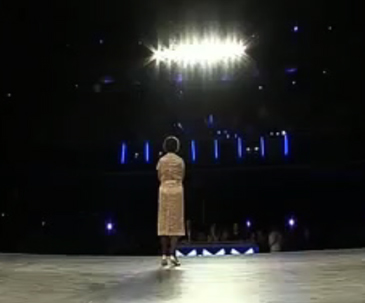
Labels: divine self, grace, self empowerment, simon cowell, spirituality, susan boyle
Wednesday, February 04, 2009
Monastic Principles for Surviving and Thriving in Tough Economic Times

For generation after generation and in culture after culture, the same truth has been taught by spiritual sages — that outer wealth is not enough to satisfy the soul. With the materialism of our world getting so out of balance in recent decades, it is not surprising that a kind, loving, and conscious universe would step in to bring that materialistic obsession into balance – and voila, your budget gets slashed. Gee, thanks, universe.
Nobody likes having to go through tough economic times, but as dear Mary Poppins said, a spoonful of sugar makes the medicine go down. In the case of economic setbacks, this sugar consists of the beneficial potentials and important lessons that can come from loosening our attachments to temporal treasures that won’t last. To paraphrase Jesus with a touch of modernization:
"Do not store up for yourselves treasures on earth, where moth and rust and good stocks gone bad consume and where thieves and incompetent CEOs and hedge fund managers break in and steal; but store up for yourselves treasures in heaven, where neither moth nor rust nor layoffs nor bear markets consume and where thieves do not break in and steal. For where your treasure is, there your heart will be also."
Whether through natural disasters or man-made aggressions, wars, thievery, or incompetence, people in all times and cultures have been given opportunities to remember that their worldly treasures are temporary and subject to decay and loss. If such losses help open our awareness to more sublime treasures in life, then those tragedies become great personal triumphs. Many people have risen from the ashes of challenging experiences into new realms of success and happiness after approaching their challenges with appreciation, enthusiasm, and a positive spirit.
Whether we shift our attachments, greed, and desires voluntarily or involuntarily, certain principles can help us to create a more peaceful and happy life. These principles are often followed by monastics – the kings and queens of simplicity who, for thousands of years, have sought a deeper connection to the universe by shaving their materialistic lives down to the minimum.
Monastics treasure their aloneness and sparse surroundings just as non-monastics treasure their social lives and belongings. They have chosen to step out of the usual fray of frenetic worldly life and into a space of deep inner focus. The word monastic comes from the Greek “monos,” which means alone.
In almost every time and culture, you’ll find spiritual seekers whose quests have led them to retreat into simpler lives, whittling their belongings and needs down to the bare essentials. Some monastics, such as Saint Francis and Teresa Lisieux, were penniless and barely known during their time, but have since achieved spiritual fame as people around the world remember them and visit their shrines for inspiration.
I have devoted my energies to the study of the scriptures, observing monastic discipline, and singing the daily services in church; study, teaching, and writing have always been my delight.
— Venerable Bede
Aside from moving to a cave or monastery, how can people living in a commercialized society find their way back to simpler roots? How can those who always think they need more realize that they can be happier with less?
One way to shift a materialistic focus back into balance is through losing some of the outer wealth that we may have thought was so important. Economic losses can be beneficial to our personal evolution if we are able to respond in a positive way. We may not always be able to choose what happens, but we can choose how we respond.
When approached with positive thoughts and actions, the same economic downturns that create so much unhappiness can also end up being just the medicine to spur us into new fields of spiritual awareness, happiness, and freedom.
Some people do understand the value of simplifying their lives and may choose to go outside their comfort zone by camping, climbing mountains, or visiting third-world countries. Even going to a spa can be an experience of simplifying their lives for some folks, depending on the person and the spa.
At the Golden Door Spa where I’ve offered many lectures on topics such as “The Inner Makeover,” guests spend many thousands of dollars per week to come and live simple lives while working very hard. Their day begins with a silent hike up the hill at 5:30 am followed by a full schedule of exercises, courses, massages, facials, meditations, yoga, and no alcohol aside from one optional glass of wine on their final evening. This is not a spa where you see sunbathers sitting around the pool playing scrabble and drinking martinis. Aside from the lack of prayers and devotionals, this spa’s schedule is similar to the monastic life I used to live in an Indian-based ashram.
The guests come to this challenging spa because they know it’s good for them. They leave their daily lives aside to have a weeklong taste of a sparse but comfortable life, with simple rooms and healthy meals. The guests spend most of their time in robes or simple workout clothes, and usually don’t wear any makeup. They don’t have to let anyone else know “who they are” in their worldly life, and can simply be themselves.
Even a week of this life of inner repose, yoga, meditation, exercises, and courses (with pampering) allows guests to replenish and nourish their personal, physical, mental, and emotional strength and to keep their lives in proper perspective. The atmosphere is one of inward focus and personal growth, with many elements in common with a monastic life.
Once I was having dinner with some of the Golden Door guests when our dessert was served – it was a small raspberry turnover. The elderly woman seated across from me wasn’t served a turnover because she had requested meals with no wheat. Instead she received a small dish of fruit. The woman became somewhat upset and anxiously told the wait staff that this wasn’t really the kind of wheat she meant. Of course, this woman knew that she could ask for ten turnovers and probably get them, but that would defeat the purpose of the week, both in discipline and in diet.
I’ll never forget watching this woman who was probably a multi-millionaire joyfully receiving her little turnover and then cutting off just a small corner to eat before wrapping the rest up to save for the next day. “I get hungry in the mornings,” she explained, sounding like a little waif who had to beg for morsels of food. I could see a glimmer of satisfaction as she tucked the remaining part of the turnover into her pocket.
Whether voluntary or involuntary, economic downturns are great times to rein in the greed machines of endless accumulation and take back our peaceful, contented lives. You don’t have to have more stuff to be happy. You don’t have to go to movies or play video games to be entertained. You don’t have to buy more make-up or expensive clothes to be beautiful. You don’t have to have ten or even one hundred times what you need (I’m thinking shoes, ladies!) You don’t have to purchase obligatory expensive gifts to show how much you care. Contrary to what advertising agencies want you to think, surrounding yourself with more stuff is not the answer.
Some folks have a difficult time sitting quietly for even half an hour, but monastics actually choose to live this kind of simple, peaceful, and inwardly focused life all the time. Still, integrating monastic principles into your life doesn’t require a radical shift. Jesus instructed his followers to “Be in the world but not of it.” You can add touches of monastic principles – times of quiet repose, contemplation, prayer, and contentment – and give yourself the inner resources to make the most of what you have, whether your finances are in an upswing or a downturn. You can enjoy all the abundance and challenges of your life, while keeping your foundation rooted in your eternal soul nature.

I spent ten years living a monastic life in an Indian-based ashram, and can assure you that most of us were definitely and demonstrably works in progress when it came to expressing the qualities of acceptance, harmony, respect, and brotherly love that are pillars of monastic life.
My spiritual teachers were vibrant, exciting, and fairly well known guides – they’re the spiritual gurus described in the “Pray” section of Elizabeth Gilbert’s book Eat, Pray Love, and Elizabeth’s narrative shows how liberal the ashram’s open door policy was for many years.
The excitement and energy of this path attracted hundreds of thousands of unlikely monastics – lawyers, celebrities, customer service representatives, doctors, actors, housekeepers, mothers, fathers, daughters and sons of every possible occupation and walk of life – who would come to spend a day, week, month, or even years waking up super-early every morning for a full and challenging day of meditation, chanting, service, scriptural study, and focus on the divine inner Self. The goal of coming for an ashram retreat was to develop a love of these disciplines and principles that would continue to nourish people when they returned to their worldly lives.
When you arise in the morning, give thanks for the morning light, for your life and strength. Give thanks for your food, and the joy of living. If you see no reason for giving thanks, the fault lies with yourself.
— Tecumseh, Shawnee Chief
Using monastic principles to bring ourselves into harmony with the shifting circumstances of life can allow us to experience economic downturns without too much suffering. Principles such as simplicity, service, and contentment can turn difficulties into avenues of gratefulness, growth, and remembrance of what is more important in our lives.
Here are some monastic principles that can help you to not only survive but thrive during tough economic times, regardless of your religious or spiritual path or lack thereof:
The Principle of Contentment
This monastic principle says: If you have less, enjoy and appreciate whatever you have. If you have more, enjoy and appreciate whatever you have (and be generous with others). In other words, even while working to achieve your goals and dreams, be content with whatever you have right now.
An adjunct to this principle of contentment is the principle of simplicity – finding contentment in the peacefulness of simple enjoyments, such as a simple walk through nature, deep conversations with friends and family, and taking time to focus on improving ourselves from the inside out through meditation, prayer, self-examination, contemplation and other methods.
I’ve been from one side of the financial spectrum to the other – from a simple ashram lifestyle where purchasing a new toothbrush would be an occasion of great joy to a successful, six-figure Hollywood career. Then, after working too many hours to keep that successful career going, I became physically ill and spiritually world-weary, and moved to Cardiff by the Sea for a time of healing and creative service, once again living a simple life without much money.
Thanks to the principles I learned in the ashram, I was still able to experience a certain contentment during this decade-plus of low-income living. I decided to choose happiness and align my thoughts and feelings to be in harmony with what the universe was giving me. I chose to be content with whatever I had and whatever I didn’t have, and focused on giving good spiritual artistic works to the world.
One of the charitable projects I offered during these years was to script and edit a documentary about an amazing woman who went by the name Peace Pilgrim and walked back and forth across the country for nearly three decades as a penniless wanderer in the name of peace. She wouldn’t accept money or car rides, and would eat only when someone offered a meal, and sleep when someone offered a bed, or at a truck stop or a field by the side of the road.
During her walks, Peace Pilgrim touched people personally and through the media. She spoke about the blessings she experienced from living at need level, without having to spend so much time and energy taking care of a lot of possessions. Peace understood that her need level as a monastic-style pilgrim was not nearly enough for most people, and she urged people to find their own need level.
In the newsreel footage I used in this documentary, Peace showed off her worn and tape-covered shoes like a trophy – she claimed to only need a new pair every 1500 miles – and the look on her face as she turned her battered shoes toward the news camera was filled with light and exuberance. As Peace Pilgrim would often explain with her lilting voice, what she wanted and what she needed were exactly the same.
Without going to such extremes, you can still choose to be content with whatever does or doesn’t come into your life. Then, even in times of economic downturn, you’ll be able to make whatever adjustments are needed with a smile.
The Principle of Priorities
Contemplating your deeper goals is always a good use of time and energy. You may have all the “law of attraction” and “success” skills you need, but if you don’t know which direction you should be going, you’ll likely end up somewhere else. As Yogi Berra wisely said, “You've got to be very careful if you don't know where you're going, because you might not get there.”
Arranging your priorities is very helpful in dealing with tough economic times. If you haven’t done enough soul-searching to find what is most important to you, then the task of budgeting when resources are less can be especially painful and confusing. However, when you’ve set your priorities, which also include your personal preferences, then you can approach the task of budgeting with greater harmony and ease. One way to arrange your priorities is to make a list of all the expenses in your life and give each one a number from one to three (or one to five if you want to allow for greater nuances). The divisions go like this:
- Assign a number one to the things that are most important to you –perhaps taking care of family and pets, living alone without a roommate, having personal transportation, or having cable TV and computer access. Items in this category are things you definitely do not want to eliminate from your life if at all possible.
- Assign a number two to things you really could do without right now. I had to create this kind of list when I left my high-income job. The first thing to go was the cell phone. I certainly didn’t need to be accessible by phone at all times in my simple new lifestyle. For me, clothes were also on this part of the list, since my somewhat reclusive lifestyle didn’t require me to be especially fashionable.
Some people spend massive amounts of money to buy cars or clothes just to impress other people. Even if your job requires a good wardrobe, there may be some things that are not necessary to make a professional impression. Again, this is your list, not mine. If clothes are on your number one list, then you can find other areas of expenditure that are not as important for you to have. - Everything else goes into category three: things you keep if you can. If finances go down to the point that you have to let some of these optional expenditures go, well then you’ll just have to do that.
Once you’ve arranged your priorities in this way, even if you miss certain enjoyments, the great thing is that you’ve hopefully managed to fund all the items on list number one and will still have those things that are most important to you.
The Principle of Sharing
In monasteries, members share in the work and in the benefits. Many monks even call one another brothers or sisters, and there is a sense of a larger family that for some extends to include all of humanity, as well as animals and other forms of life. It’s a big family. But it doesn’t have to be a dysfunctional family. Once we recognize the value of every human being, it is easier for us to share what we have. If you have more than you need and your brother or sister is in need, then monastic principles would guide you to share what you have with them whenever and however possible.
When I lived and worked in Hollywood, one of my greatest joys was to help others with some of my extra income. I loved to bring poor folks into a grocery store and tell them to fill the basket with whatever they wanted to bring home to their families. When a receptionist at work had to spend a month in another city to take care of her ailing son, I was able to phone the motel and ask them to put her stay on my tab. Not only did these acts give me great happiness and nourishment of spirit when I offered them, but they also brought comfort and contentment when I ended up going through my own times of need a few years later. My heart would lighten while remembering that when I had enough, I had given generously to others. I sensed that when the time came for me to leave this world, my acts of sharing and helping would be the great jewels that would give peace and perhaps even go with me, in some subtle karmic sense, into whatever lies beyond this life in this world.
Psychological studies have shown that sharing is beneficial to the giver, the receiver, and anyone who witnesses the generosity. During times of societal economic crisis, this attitude of sharing and helping others is a key to keeping a temporary downturn from becoming a long-term disaster. As Pope Benedict XVI said during his 2008 Christmas message in the midst of a worldwide economic crisis: "If people look only to their own interests, our world will certainly fall apart."
Without this kind of sharing during an economic crisis, qualities of greed, fear, hoarding, and divisiveness could take hold. Then we’d see families on the street with nowhere to go while homes across the nation sit empty, or bought up for pennies on the dollar by fat cats who just want to guzzle more and more into their bottomless pits of greed, eventually creating almost a third-world situation for our country and the world.
Each man takes care that his neighbor shall not cheat him. But a day comes when he begins to care that he does not cheat his neighbor. Then all goes well — he has changed his market-cart into a chariot of the sun.
— Ralph Waldo Emerson
The Principle of Present Moment Focus
One purpose of monastic life is to turn one’s attention inward instead of focusing on the outer world. This present moment focus can translate as the practice of mindfulness in whatever you are doing, whether cooking, gardening, or arranging various affairs.
When you’re focused in the present moment, your mind becomes calm, like a lake without ripples. When the surface of a lake is calm, you can more easily see into its depths – so it is with the mind.
Your mind is a great tool; in fact some sages describe the mind as a portion of the infinite universal consciousness that has created everything. The mind can be either your friend or your enemy, and is often a bit of both. Focusing on the present moment allows your mind to be friendly, clear, and patient. After all, when you’re in the present moment, what could you be anxious for but another present moment?
In terms of economic challenges, when you’re focused in the present moment, you’re enjoying what you have today rather than spending today worrying about what may or may not happen tomorrow. You’re able to approach the present moment with focus and inner strength and take care of whatever preparations are appropriate to make for the future, but your attention is on the eternal now as it manifests in each moment.
One way to practice present moment focus is to look at yourself at any time and ask, “Am I okay right now?” Unless you’re in extreme physical or emotional pain, the answer is hopefully, “Yes.”
Through this practice, you come to see that in spite of some challenges, setbacks, and fears about the future, you are fine in each present moment. Then you can change your practice to declaring rather than asking, by stating, “I am fine right now.” This affirmation helps to not only define but also welcome your present state as being fine all the time.
The Principle of Forbearance
The good news about learning to suffer cheerfully is that this cheerfulness helps to alleviate the devastating experience of suffering and allows you to make better decisions and take more productive actions to alleviate the causes of suffering.
Once I was participating in a vespers service at a Benedictine monastery, when one of the older monks tripped and fell flat on his face, with blood starting to ooze out onto the floor. Without even the slightest ripple in their peaceful demeanor or cheerful faces, several of the monks brought in a wheelchair and gently wheeled the monk out for medical attention, while another monk wiped the blood off of the floor. This was a great demonstration of the blessings that can come from monastic life – an ability to stay peaceful even while attending to unexpected disasters.
Even non-monastics can find the inner resources to respond to challenges with a peaceful demeanor. If you’ve watched television news reports from scenes of extreme disasters where families have lost their homes and everything in them due to floods, fires, earthquakes, hurricanes, and all those other, ahem. . . “gifts from the universe,” then you’ve probably seen interviews with the victims of these tragedies.
Every now and then we see people who do not act like victims, even though they’ve lost so much. Instead they choose to suffer their losses cheerfully and to find greater appreciation for their loved ones who still remain. Some also use their moment in front of the microphone to express faith in the divine, or to share how this traumatic experience has shaken them into remembering what is most important in their lives.
Even though these folks are still in painful situations where they’ve lost many valuable things, they are not suffering as deeply as they would be if they were feeling resistant, angry, and victimized without using personal and spiritual tools to reframe a dark experience in an authentic and positive light.
I wish I could show you,
when you are lonely or in darkness,
the astonishing Light of your own Being.
— Hafiz

Having forbearance doesn’t meant that you don’t experience sadness or upset over losses, especially when you’ve lost not just a chunk of your savings, but the basic necessities of your life. The point of applying these monastic principles is not to numb yourself or pretend to be unaffected by tragedy, but to add a note of cheerful peacefulness and conscious care to whatever you’re going through. Even if you’re feeling unhappy or angry about suffering certain losses, you can still remember the bigger spiritual picture within which everything is ultimately fine. You can remember that whatever you’ve lost is less important that what you still have – life, breath, conscious awareness, the ability to perceive, the heart to love, and the power to give.
Labels: economic crisis, happiness, inspiration, monastic, principles, society, spirituality
Friday, November 14, 2008
Choosing Our Future

- The Sanskrit word ghora can be translated as "terrible." Ghora attitudes, energies, and actions pull the world down into the cesspool of delusion, fear, anger, hatred and greed.
- Placing "a" before a Sanskrit word generally means "not" that thing, so aghora thoughts, intentions, and energies lift the world up to higher goodness, consciousness, rightness, respect, and light.
If the higher aghora energies win this contest with a "majority of the vote," many will find the growth, blessings, and lessons available in this and every kind of downturn that can challenge our spirit and resources, individually and as a society. Through good thoughts and right actions, people moved by the higher pull to light, oneness, compassion and positive thoughts will have an opportunity to step up above the frey of usual mediocre living to shine their light more brightly, to be kinder to others, and to share what they have more generously.
Ultimately the goal of this higher aghora nature is to bring liberation from that which covers our spiritual awareness, and creating more positive actions, thoughts and energies in this world can create a much better field within which to attain greater personal and spiritual heights.

The higher approach would lead to greater prosperity of many kinds, while giving people an opportunity to give and receive more freely during what would likely be a short-lived economic crisis. Artists would give their works; doctors and dentists would be moved to offer their skills to help those who are suffering but unable to pay for their services, parents would help their children and vice versa; we’d see friends helping friends with small loans or gifts to help them to make it through this time.
People would delve into their greater wisdom and spiritual awareness to be true Christians, true Buddhists, true Hindus, and true Muslims. The societal consciousness would expand beyond its recent focus on greed and materialism, and shift to a greater universal view of interdependence and empowered selflessness. Those who have bank statements that report more than they'd ever possibly be able to spend would give generously to help those who need a relatively small amount just to keep their lives together. Humanity would shine forth in its greatest glory. Some would say that to force this kind of sharing is called socialism, but when it done voluntarily, with a deeper understanding of spiritual laws, it is simply the expression of a good and decent human being in an evolved and conscious society.
If the lower ghora energies were to have their way during this economic crisis, then greed, fear, hoarding, and divisiveness would take hold. Then we’d see families on the street with nowhere to go while homes across the nation sit empty, or bought up for pennies on the dollar by fat cats who just want to guzzle more and more into their bottomless pits of greed. Ghora energies could create almost a third-world situation for our country and the world.
A traditional American Indian story tells of an elder who was teaching his grandchildren about life. He said to them, "A fight is going on inside me, a terrible fight between two wolves. One wolf represents fear, anger, envy, sorrow, regret, greed, arrogance, self-pity, guilt, resentment, inferiority, lies, false pride, superiority, and ego. The other stands for joy, peace, love, hope, sharing, serenity, humility, kindness, benevolence, friendship, empathy, generosity, truth, compassion, and faith. This same fight is going on inside you, and inside every other person.”
One child asked his grandfather, "Which wolf will win?"
The elder replied... "The one you feed."
Labels: economic crisis, human nature, positive teachings, spirituality
Sunday, November 09, 2008
THE HEALING OF A NATION: An Exploration of Spiritual, Metaphysical, Social, and Karma Lessons from the 2008 US Presidential Elections

This year I had to pay attention because this election was tremendously significant in deciding the future course of human life and culture. This was a test of our country’s evolution, in my view, one of the most determinative events and choices in all of human history. Political correctness aside, I knew, mind, heart, and soul that this election was a pivotal choice between darkness and light for our country and the world. We also had such a choice after September 11, 2001 when the entire world was mourning our losses after being attacked on our soil. I discuss some of the choices we faced and made after this event in Secret 29 of the book Secrets of Spiritual Happiness: "Finding Grace in Challenges and Blessings from Tragedy."
Let me begin by sharing my personal worldview that, from a greater perspective, this universe is a conscious, karmic, and ultimately benevolent teacher. As with most significant events, this election has been filled with a wide variety of spiritual, metaphysical, and karmic lessons. We’ve gone through a very exciting season of “Political Idol,” and so here I offer my piece of the puzzle by sharing some observations and thoughts about the 2008 elections.
Our Tabloid News Culture
I have to take some responsibility here for being an editor for the first tabloid television show, “Hard Copy,” in 1989, just weeks after leaving a decade of spiritually vibrant monastic life to move to Hollywood. This successful show began before cable news or 24-hour news had hit the media landscape, and its success inspired some news shows to tilt to the tabloid.
While I worked at Disney’s KCAL-TV in Los Angeles, our producers would snigger as the program manager for our local CBS affiliate started turning his station’s news shows into slash-and-burn shockers, implementing an “if it bleeds, it leads” mentality that had not been so prominent in the news landscape before this time. Eventually, I also did free-lance work at this KCBS station, which included editing sports a few times with none other than Keith Olbermann, who was fairly patient with my lack of sports knowledge.
The best example I can cite to show the kind of numbness to horror that pervaded the KCBS newsroom is when I edited a story about a man who had been shot, stabbed, and run over by a car (I was at least directed not to show close-ups of the sobering carnage). In a news show, each story has a short phrase called a “slug” that identifies it in the news program schedule. For example, a story about the mayor giving a press conference about crime might be called “mayor press crime.” In the case of this poor man who had been shot, stabbed, and run over, the official slug for the story was “bad day.”
Since that time in the mid 1990’s, news has become even more sensation-focused, because in general, television shows go where the money flows. Their goal is to entice you to watch their show, even it it means creating a gossip society that obsesses over salacious and embarrassing details about public figures. Surely these practices have harmed society on many levels, and this year we all had a chance to see politicians also play into this tabloid mentality by firing shocking allegations that the hungry media machine would lap up and spit out again and again. I’m sorry to say, dear Darwin, but it seems we haven’t really evolved all that much from when our ancestors sat in Roman coliseums cheering with thumbs up or down while watching people get ripped apart by lions.
One other aspect of this tabloid media that has become more pronounced this year than ever is what I call the “ya drishti sa srishti” effect. “Ya drishti sa srishti” is actually a deep philosophical concept from ancient India that generally translates as “the world is as you see it.” This teaching points to the effects that our beliefs and preferences have – not only on how we perceive the world – but also in a metaphysical way that actually affects the manifestation of this world, an idea that is touched on by materialistic manifestation fads such as “The Secret.” According to “ya drishti sa srishti,” our thoughts are connected with the “mind of God” within which all creation takes place. It’s deep philosophical stuff, but a more mundane example of this teaching came up this year for those who dared to flip stations from, for example, MSNBC’s reporting of the election to Fox News.
These stations may as well have been reporting on completely different elections. Their stories were chosen to emphasize the obvious bias both stations had toward their chosen party and candidates. Even their poll numbers were completely different. Obama was way ahead on MSNBC during the same times that McCain was ahead on Fox. Liberal blogs were showing double digit leads for Obama, while Drudge Report headlines announced McCain’s surprising lead. This really was a case where you could choose whatever station or websites matched your view of the world and have the comfort of living in that news reality without too much ideological trauma, as long as you didn’t change the channel!
Deception and Twisted Words
Honesty hasn’t exactly been given a front row seat in this 2008 election. I have a reasonably dependable BS meter, and it has been on overload, not only during the 2008 elections, but for the past eight years – rather make that ten years to include the attempted destruction of President Clinton, whose own deceptions gave others material for theirs.
Sometimes politicians use opposite words to deceive – such as calling an initiative that relaxes pollution standards the “Clean Air Initiative” or saying “Country First” while knowing that your choice of who would be a heartbeat away from leading the free world was based more on “get us elected” first. Sometimes they accuse their opponents of their own faults or weaknesses, just as war-avoider G.W. Bush accused war hero John Kerry of being a bad soldier, or as Governor Palin kept warning that we don’t know anything about Barack Obama, when he’d written memoirs and appeared in many debates and television interviews, and all we knew about Palin was that she governed a state across the maritime border from Russia, hunted moose with her young daughter, gave a lot of information that was being debunked by facts, was not well-read about world situations, not to mention not knowing the job description of the vice president, and was boldly proclaiming a lot of personal achievements that didn’t seem to pass the truth test, while shouting, “Who is Barack Obama?”
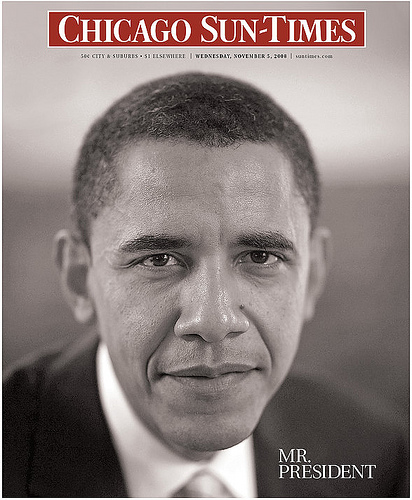
Personally, I feel that President Obama ran an impressively sincere, calm, and honest campaign, especially considering the pressures of the race and the accusations being hurled his way. In general, Obama showed integrity by fighting dishonesty with truth and refusing to step into the mud bath that some opponents were throwing – first at him and, once the campaign ended, at each other as some turned their predilection for exaggerations and accusations toward the pretty girl they’d brought in to enliven the ticket.
There Senator McCain would be day after day, shouting that Obama was going to raise taxes while speaking to crowds of people who would almost all receive tax breaks under Obama’s plan. How many hundreds of times did McCain bring up Joe the Plumber, who was neither named Joe nor a licensed plumber – talk amongst yourselves. . . In fact, with “Joe” not really having the money to purchase the company that didn’t actually make as much as he’d described while questioning Senator Obama, Joe would also benefit taxwise from Obama’s plan. Still, with complete disregard for the facts, McCain and Palin continued to hammer home with repetition and convincing conviction the false accusation that Obama wanted to take money away from Joe the Plumber (whose book is now available for pre-order at www.secureourdream.com).
Senator McCain and Governor Palin got trapped into bitchy mode for more than a month before the election, filling nearly every speech with snarky, angry, over the top accusations. It started during the RNC convention with Governor Palin taunting Obama for being – sneer – a “community organizer.” By the way, Ms. Palin, it looks like being a community organizer isn’t such bad experience for a candidate to have when he's wanting to get people out to vote, or for a president who needs to be able to organize local, national, and world communities.
Senator McCain and Governor Palin actually used their soapboxes to trigger and call forth the very worst qualities of the American psyche – prejudice, fear, hate, and aggression. During the final weeks, these candidates hardly mentioned their own platform aside from vague superficial fluffs, while putting forth terrible examples to the nation’s children and adults of how to speak about others. If you’ve got information, put it on the table, but shooting out nasty exaggerated slanders to incite anger and hatred goes way beyond the level of evolution human beings should have reached by now.
All you had to hear were the responses of the crowds – including the one booing at the mention of our new president’s name on election night and shouts of “terrorist” and “kill him” during the campaign to see what damage these candidates have wrought upon those who were most vulnerable and susceptible to being dragged back into the kind of unenlightened ignorance that has plagued this country’s history. Even the secret service had to increase watch of Obama after receiving heightened warning of death threats.
Now that the election is over, these attacks have left a large group of people feeling angry, hateful, disenfranchised, and perhaps in some cases, violent. With due respect for your service to this country, heck of a job, John McCain. You always were regarded with respect for your decency and integrity in spite of slipups such as the Keating Five and the way you left your first wife, but in just a month, you've created a significant dent in your legacy and the positive impact I’m sure you would like to make upon the world.
Karma is as Karma Does
One important understanding we can gain from the ancient eastern philosophies, is the understanding of “karma.” No English translation does justice to this word, though the statements, “as you sow, so shall you reap,” and “what goes around comes around” can at least give some sense of karmic law.
The best way to grasp karmic law is to watch the world as it manifests inside and around us. This life is a living textbook on the laws of karma. We can observe how our thoughts so often create exactly what they most desire or fear; watch as the most vehement persecutors seem to inevitably become the persecuted, and notice how our own good actions can lighten our hearts and create an opening for more goodness to enter our lives. Even the scripts of our movies and novels reflect our intuitive understanding of these laws, as good wins over evil nearly every time, even if only moments before the final credit roll.
What screenwriter could have come up with a more creative set of situations and cast of characters? As reality-based television producers have discovered in recent years, fact is definitely more compelling than fiction, especially when no friend or reviewer is able to spoil the ending before we get there. We’re all watching this movie together.
One spiritual truth we can apply to this situation is to enjoy the play of creation as it evolves before our eyes, and to participate in learning from it, both on a group level -- as a country and planet – and also on an individual level. A multi-faceted event such as this election is not a bad thing, but rather an opportunity to explore and discuss and improve our beliefs and institutions.
As I write this, the same Republican campaign managers who told Sarah Palin to “come on down” from Alaska to play "Let’s Make a Deal, world leader style," have been plundering her name in the press. Breaking News: “One aide estimated that she spent ‘tens of thousands’ more than the reported $150,000, and that $20,000 to $40,000 went to buy clothes for her husband. Some articles of clothing have apparently been lost. An angry aide characterized the shopping spree as ‘Wasilla hillbillies looting Neiman Marcus from coast to coast,’ and said the truth will eventually come out when the Republican Party audits its books.” Other reports have Governor Palin apparently unaware of what countries make up North America and whether Africa is a country or a continent. Oh, and she also popped out of the bathroom of her hotel room wrapped in just a towel and told the campaign aides to talk with her husband while she got dressed for their meeting.
These things would have been more useful to share before voters possibly elected this unprepared person to one of the highest offices in the land. Now, it is looking like a snarky attempt to dethrone and destroy her name, which – hmmmm – looks vaguely familiar. Who has spent the previous month spreading this kind of slander about someone else? Why, it was Sarah herself, suggesting not that Barack Obama wasn’t qualified to be president or that his policies were wrong, but that he was, gulp, a terrorist loving figure who just might want to destroy America. Not only did Palin smear Obama’s name but also that of his minister and people who had worked on committees with him, bringing up events from the 1960’s to destroy Obama with little care for the collateral damage that might be caused in other’s lives.
Well, Sarah, what these gossipy republican aides have done to you is not nice, and anyone with a sense of compassion would feel sorry for you – yet, there is a sense of justice in it all. As a fortune cookie version of karmic law might say, “If you smear others, you eventually get smeared.” All you have to do is look at other smear campaigns throughout history to see that this karmic payback happens all the time. When people like Congressman Henry Hyde and Speaker-designate Bob Livingston worked to impeach President Clinton due to his infidelities, their own dalliances were uncovered, as both persecutors resigned from their positions in shame.
From a higher perspective of karmic law, the post-election attacks against Sarah Palin may actually be a blessing, because they help to dissipate the negative karmas she created while stirring up hate and running a McCarthy-style campaign that was harmful to everyone concerned, including the country at large. According to karmic law, every action brings forth a responding action or event, and sometimes it is a case of the sooner the better. Karmic responses can come in a day, a week, month, year, decade, or even perhaps in future lifetimes, according to reincarnation theorists. For Sarah Palin to get smeared back so quickly after smearing another just may help to free her from that dark karma cloud and give her the opportunity to learn some lessons and change her ways in the future.
Imagined Plotlines
In my musings while trying to make sense of all the strange twists and turns of this elections saga, I came up with two scenarios that might make a good novel or movie plot.
The first storyline would be similar to the movie “The Producers,” where the producers came up with a way to scam the Broadway show system by creating a play so bad that it would be shut down immediately, bringing in a large insurance fund settlement. The play was called “Hitler in Springtime,” and in spite of the title and the ridiculous play, it became popular.
In a similar way, my plot would have some of the bad-seed republicans realizing that they’d plundered the country so much that only a democratic agenda could possibly bring the wealth and standing of the United States in the world back up. Karl Rove and Dick Cheney types come up with a plan to basically throw the election and find their way back in once things are filled up again, with a plan for more upward direction of wealth into the pockets of their friends and companies like Halliburton.
In my imaginary film script, these “producers” use various stealth methods to bring back a candidate who had been all but written off – someone who had so many counts against him that he would never be elected. This candidate was older than any president in United States history -- he'd been through bouts with cancer, and had been tortured for years – which might make him a hero, but also would likely bring psychological scars to rival his inability to raise his arms up to shoulder height. The producers are certain that only the reddest republicans would vote for him, bringing about the democratic win that they secretly want.
The producers (Karl Rove, Dick Cheney, et al) are shocked to find that McCain is still leading in the polls. What to do? They arrange for their insider campaign advisors to insist that McCain bring on as second in command and a heartbeat from the presidency, a pretty lady who had barely eked a journalism degree out of five different colleges, to go with John McCain being fourth from last in his class. They’d seen this lady in action before and knew that it was only a matter of time before she showed her lack of preparation for a role with such high responsibility. But then time went on and on, and no matter what ignorance came through Palin’s few interviews, more than half the country still wanted to vote for her! Even these “producers” were shocked to find that they’d overestimated the public.
What they didn’t take into account was how the whole country had become numbed by having a president and administration that for 8 years sputtered, lied, and showed the intelligence of teenage boys playing a game of dungeons and dragons. After nearly a decade of such shennanigans, many Americans had lost their discernment, as our fellow countries could see.
As an aside, I remember watching an episode of Larry King Live several years into GW Bush’s presidency. Bill Clinton was the guest, and while watching him speak, I was completely shocked and in awe. He was a genius! I realized that my high opinion of Clinton was also a sign of the relatively stupid veneer of the current administration. Clinton actually seemed to think what he thought, unlike GW Bush. He thought it and then said it as clearly as could be. He didn’t use catch phrases or cowboy words, but spoke the way one would expect an intelligent world leader to speak. Indeed we had been numbed by mediocrity.
So my imagined movie plotline continues as the “producers” realize that their bimbo pick of Palin was backfiring, because she was also ruthless and had no qualms about stirring up deeply seated racial fears and hatred. Finally, the “producers” find a way to crash the entire economic system, which finally gets even the most extreme racists to vote for Obama, because. . . black don’t look so bad when you’re in the red.
A second version of this movie theme had more of a “Defending Your Life” comedic flavor, with astral plane world event designers realizing that the United States was going down and bringing the rest of the world down with it. One of the reasons for this plunge was an accumulation of bad karmas from bad actions that had been undertaken by the country and its representatives. The recent wars and many civilian casualties were the straw that broke the camel’s back, although the biggest blight on the United States’ karmic record was something much more awful and long-term – slavery.
The only way to save the country was to heal this karma by honoring a member of this race with the highest position, and since these were not Karl Rove or Dick Cheney, but being astral plane angel types from the “department of karmic rightness,” they were able to select and mold the perfect person for this role, who happened to be Barack Obama – half black, half white, relatively free from the usual corruptions in his public and personal life, a great community organizer who would be able to bring the whole country together, and as intelligent a man as they come.
This second “movie script” goes on with many of the similar machinations in an attempt to get “old America” evolved enough to do the right thing (as Spike would say). Well, there were many more details, but these are the gists of my creative attempts to make some sense of the strange twists and turns I was watching in this 2008 election.

To quote President Gerald Ford, when he became president after Nixon resigned, “Our long national nightmare is over!”
The United States of America and the world in which we rest finally have a leader with intelligence, authenticity, right motive, and soul. With his election, we move from ignorance to intelligence, darkness to light, greed motives to altruistic goodness, and messy confusion to careful decisions. The sun will shine a little more brightly, birds will chirp a bit more happily, and people will be kinder to one another. Okay, maybe that’s a little overboard, but it does feel great to even think such things.
I was the editor and associate producer for the children’s shows Mighty Morphin’ Power Rangers and X-Men, where the heroes would often save the entire world from destruction by one or the other monster. Now, I finally have a taste of the relief that comes from feeling that the world has been saved. In this case, it was saved by the victory of intelligence and democracy in action, as well as a lot of hard work, money, and dedicated efforts by many, including of course Barack Obama and his family, whose job is just beginning.
Sure, our tears of joy came in part from the greatness of electing a black president, from looking at elderly, middle-aged, and young black people and feeling the glow of renewed hope for them as well. Electing a black man somehow brings a certain meaning, perhaps even an archetypal justification to the terrible acts we perpetrated on this race of human beings – taking so many away from their loving homes across a large ocean to a world where they were sold and treated like cattle. It is a great day when a nation can right such a wrong.
But the tears of joy for this election, of which I shed quite a few myself, also come from something much larger than the color of Barack Obama’s skin. We have finally elected an intelligent man who really seems to have right motives and little baggage – a man who seems to really be the kind of loving family man, husband, and father that we haven’t seen in the White House for a very long time, if ever.
No longer do we have to apologize for having a president who can sometimes barely eek out a thought or sentence, and thank God we managed to avoid putting someone else in that position who doesn’t know her basic government civics and geography, among I’m sure a very many other lackings. No, it took a lot of work by the universe and perhaps many angels on high and here on earth to make this shift, but we did it. “Yes we can” became “yes we did,” and for those who see the world with eyes that seek peace and happiness for all, we’ve shifted into a whole new world.
Now, one of my more sober friends recently wrote on his Facebook page that he always thought that church and state were supposed to be kept separate. “Be warned about messiahs. They have a funny way of disappointing you.”
Of course, he is also correct, and my response to him was, “Don’t worry John, it’s just that relative to this past decade, having a representative with intelligence, eloquence, and right motive just feels like a messiah.”
For those like me who have been watching our country’s recent actions with sadness and sometimes horror, we let out a collective sigh of relief. Of course, things will go wrong – natural disasters will continue, we’re still in a major economic downward spiral, our deficit is sky high, and there are still those in the world who would like to harm our citizens to make a point. Nevertheless, when a leader has right motive and positive spirit, even challenges aren’t quite as frightening, just as in our own individual journeys, where challenges are made more palatable and heal more quickly with the balm of hope, optimism, and right action.
Barack Obama is not perfect or super human – perhaps he’s not even divinely anointed, although he is certainly Oprah-anointed. But compared with what we’ve had, where we’ve gone, and what we stood to lose as a country and individually, Barack Obama is divinely anointed, super human, and perfect enough to trust and support. He will do his best to make good decisions and seek good counsel, unlike what we’ve had in recent years.
I am enjoying this feeling of faith in the right intentions of a world leader. I often write about the importance of finding blessings in tragedy, and one blessing from the tragedies of this past decade is to awaken from apathy, criticism, and complacency and to step forward as each of us is moved to do, and offer positive thoughts, support, and even love for our country and the whole world.
Amen.
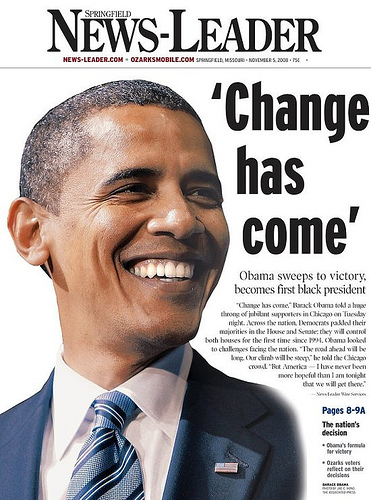
Labels: barack obama, elections, john Mccain, karma, metaphysical, Sarah Palin, spirituality
Monday, October 13, 2008
Tips for Staying Calm and Centered During the Current Economic Crisis
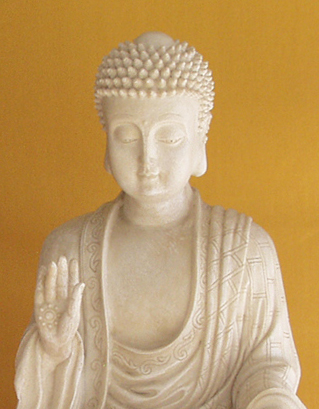
Many people are finding themselves filled with anxiety as their financial portfolios crumble. But the good news is that there is something much greater than these financial challenges -- there is an awareness that exists beyond the ups and downs of this world. Tapping into that awareness allows you to navigate the decisions of your life while remaining happy and calm in spirit.
Here are some tips to help you get centered in your higher awareness:
- Take slow deep breaths to calm your mind and nervous system. Breath in to the count of 3, hold for the count of 3, breathe out to the count of 3, and pause to the count of 3, and feel free to adjust this practice to whatever pace is most comfortable for you, with the focus on allowing your breath to move more deeply and slowly.
- During the day, as you walk, think a walking affirmation timed with your steps. You can start with, “I am happy, I am healthy, I am wealthy, I am blessed,” and compose your own personalized statements to bathe your mind in positive thoughts and words. You can also align positive words with your slow breathing exercise.
- Remember death - not in a fearful way, but with a recognition of that which is inevitable. Remembering death helps you to appreciate life. Whatever you may have lost in the stock market is just practice for the day that you will leave this whole world behind to enter a greater realm of experience. Be grateful for what you have, and that gratitude will help to outshine the darkness of doubt and fear.
- Don't listen to Suze Orman telling you (on CNN this past week) that you're going to have to live in your car and wait in bread lines. That's the same fear-mongering approach that helped create this crisis -- see this article for more on this topic.
- Have faith. If you're Christian, remember and write down Bible verses that give you greater faith that the hand of God is upon you and that He will take care of you as He does the lilies in the field. Each religion gives solace for difficult times - find whatever of these helps to soothe your mind and heart. Take refuge in the wisdom of ancient or modern sages. If you're “spiritual but not religious,” you can still have faith in the rightness of the universe and know that whatever you are going through is your destiny, your karma. We all have crosses to bear in our lives, and with them comes our power to choose to experience them with faith and happiness.
- Play gentle music that soothes your spirit and uplifts your heart and soul. Playing gentle music before you go to sleep will help to quiet the buzzing vibrations that keep you thinking and worrying. One example of good music to play before going to sleep is the "Eternal Om" recording that comes on the music CD in the back of each Spirituality For Dummies book, which you can also play online (for free) at http://www.spiritual-happiness.com/sfdcd.html.
- As you prepare to sleep at night, bring your focus into the present moment. In the present moment, everything is fine. You still have a bed to sleep in; you still have so much more than so many who live on this very same planet. Focus your attention on the sensation of lying in bed. Use whatever blankets and pillows help you to feel comfortable. Intentionally let go of the events of today and the concerns about tomorrow. Be like a child again. Your only job is to let go of yourself. Sleep in heavenly peace. . .
- Before you go to sleep, ask your subconscious mind to give you whatever dreams will help to heal your concerns and bring you peace of mind, whether you remember the dreams consciously or not. A lot of personal empowerment and healing can come from having the right dreams, and you can easily communicate with your own subconscious mind like a prayer, asking it to help you to survive and thrive through this and any other crisis.
- Instead of watching the scary news before going to sleep, take care of yourself with a cup of warm chamomile tea and some peaceful silence, as you read even a paragraph or two from a favorite uplifting positive book to guide you into a peaceful, sound sleep.
- Don't let fear or greed make you vulnerable to phishing schemes that steal your identity, free trial offers that end up costing you hundreds of dollars in hidden fees., or Nigerian princes who want to send you millions of dollars.
- Okay, you've been budgeting and denying yourself all kinds of unnecessary luxuries, but you just have an uncontrollable itch to shop. Here's one alternative. Take ten dollars plus change and go to your local 99 cent store. Get back into your childhood mentality of being able to go to the store and shop for simple but fun things, and take a good time to walk through the store feeling abundant with your ten dollar budget, with which you can purchase ten items.
- Use this financial downturn as an opportunity to clarify your priorities and simplify your life. Contemplate what is most important to you and fund that. Identify what is least important, and let it go. Everything in the middle can be decided on an individual basis. Do you really need to have that cell phone? If family vacations are a priority, are there less expensive ways to go? What are you paying for that you could do without? Do your kids really need those ballet lessons they don't really enjoy? Find simple and inexpensive ways to entertain yourself and your family. Playing a board game together can be every bit as fun as going to a movie, and a whole lot less expensive. With this kind of disernment, even when the stock market funds go back up, you'll have taken the very important step of considering what is most important in your life.
Labels: blessings, economic crisis, economy, peace of mind, psychology, spirituality

